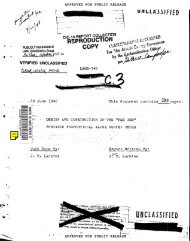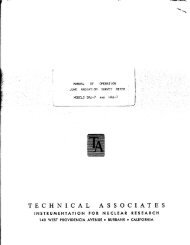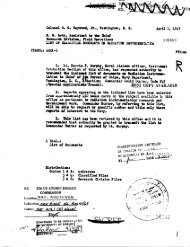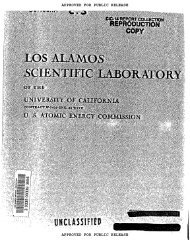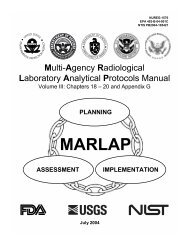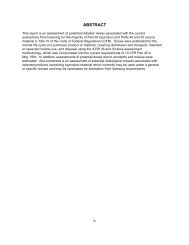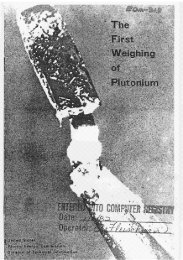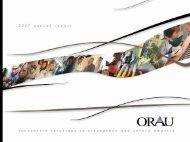Oak Ridge Associated Universities 2006 Annual Report
Oak Ridge Associated Universities 2006 Annual Report
Oak Ridge Associated Universities 2006 Annual Report
Create successful ePaper yourself
Turn your PDF publications into a flip-book with our unique Google optimized e-Paper software.
HIGHLIGHT<br />
PROFILE<br />
Faculty-Student Team Examines<br />
Responsiveness of First Responders<br />
in Catastrophies<br />
In disasters such as category-five hurricanes or<br />
terrorist attacks, why do some police officers fail to<br />
report to duty? Why do other officers always show up?<br />
These are questions that Dr. Terri Adams-<br />
Fuller and her research team—graduate student<br />
Nicole Branch and undergraduate student Leigh<br />
Anderson—explored in their research this summer<br />
at the DHS National Center for the Study of<br />
Preparedness and Catastrophic Event Response at<br />
Johns Hopkins University.<br />
The team was part of the DHS Summer Research<br />
Team Program for Minority-Serving Institutions,<br />
administered by ORISE. They applied for the<br />
nationally competitive program by submitting a<br />
research proposal to study issues related to the role<br />
of public safety officers during crisis events. They<br />
specifically examined the degradation of the New<br />
Orleans Police Department’s duty and command<br />
structure during Hurricane Katrina.<br />
“Most of us are aware that a number of police officers<br />
did not show up for duty during the Hurricane Katrina<br />
crisis and that some actually quit, but what we need to<br />
better understand is why some officers responded to<br />
the call of duty and why others did not respond,” said<br />
Adams-Fuller, a professor at Howard University.<br />
“While we have been preparing as a nation for<br />
catastrophic events, most of the simulation models<br />
presuppose that first responders will respond.<br />
However, first responders are sometimes personally<br />
impacted by such events and do not respond as<br />
expected,” Adams-Fuller explained.<br />
“We need to better understand what we can expect<br />
when those we rely upon in the midst of a disaster<br />
are torn between preservation of self and family and<br />
professional responsibility.”<br />
Image Information:<br />
The faculty-student team of graduate student Branch (left),<br />
Adams-Fuller (center), and undergraduate student Anderson<br />
(right) of Howard University studied the responsiveness of<br />
public safety officers during the Hurricane Katrina crisis.<br />
The research, undertaken at Johns Hopkins University, was<br />
sponsored by DHS.<br />
During the summer of <strong>2006</strong>, ORISE<br />
initiated planning efforts for a<br />
14-month series of functional and<br />
full-scale exercises to be conducted<br />
for the DHS Domestic Nuclear<br />
Detection Office’s (DNDO) Northeast<br />
and Southeast regions. With the first<br />
exercise completed in September<br />
of <strong>2006</strong>, ORISE will continue to<br />
provide support to DNDO through<br />
a series of tabletop workshops and<br />
functional exercises for its Operations<br />
Coordination Division. The exercises<br />
are designed to test communication<br />
protocols and assessment capabilities<br />
between DNDO and various state and<br />
local response agencies in the event of<br />
terrorism incidents involving radiological<br />
materials. Photo courtesy of Liz Roll/<br />
Federal Emergency Management<br />
Agency.<br />
49



